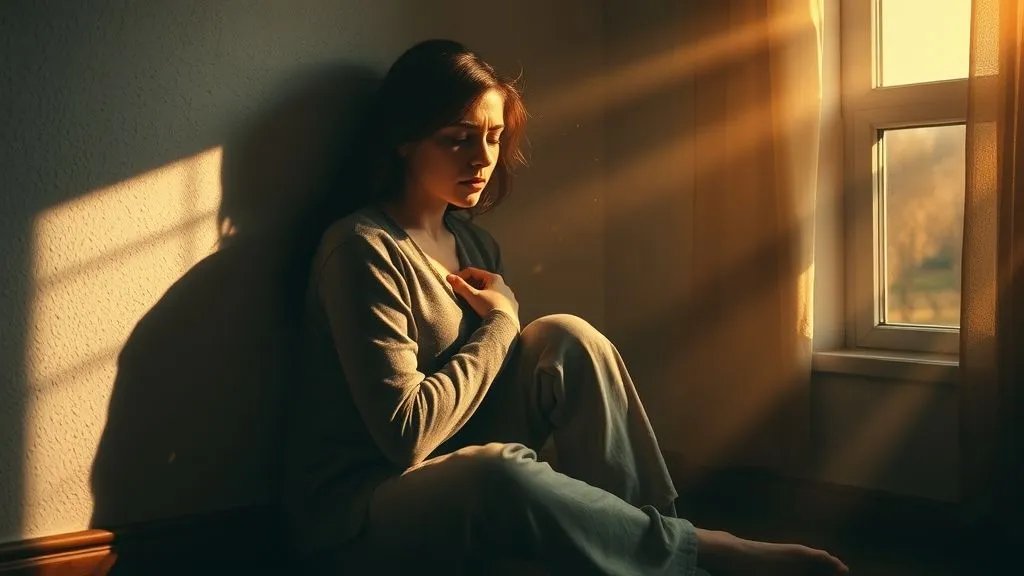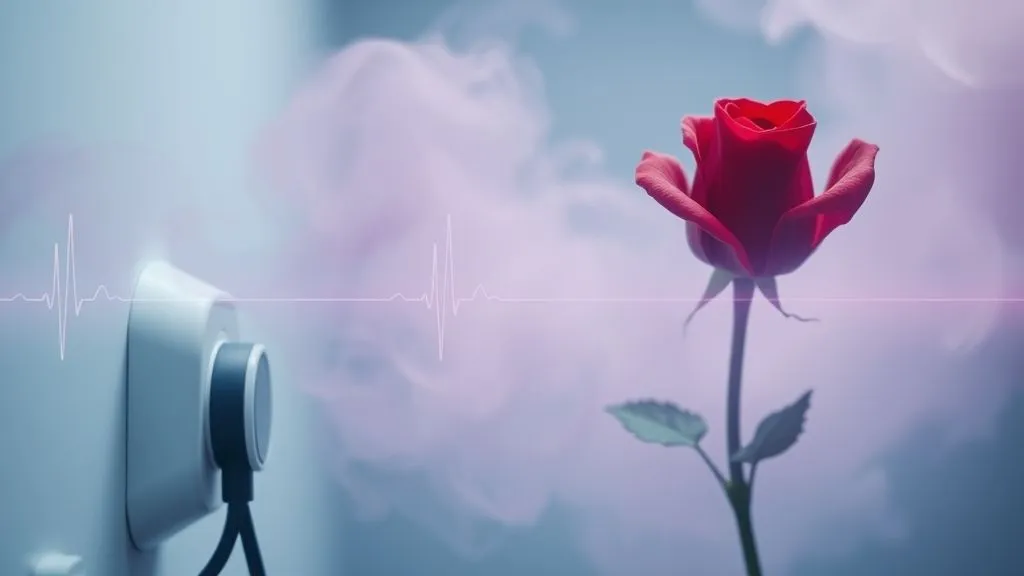
There are moments after heartbreak when the pain isn’t just emotional—it’s physical. Your chest tightens. Breathing feels like lifting bricks. You’re not just crying—you’re clutching your ribs like something inside is tearing. This is Broken Heart Syndrome. And yes, it’s real. Not just a poetic metaphor. Not just something you say in tears after a breakup. It’s a medically recognized condition, and if you’ve ever felt like love could literally stop your heart—you weren’t wrong.
This Pain Has a Name
Doctors call it Stress-Induced Cardiomyopathy. But most people know it as Broken Heart Syndrome. It mimics the symptoms of a heart attack:
- Sudden chest pain
- Shortness of breath
- A crushing weight on your chest
- Sweating, nausea, even dizziness
You rush to the ER thinking something is fatally wrong. And tests show something is—but your arteries are clear. No blockages. No heart attack. Just a stunned, ballooned left ventricle—the part of your heart that pumps life through you. This isn’t “just” emotional distress. This is your body reacting to heartbreak the way it might to a physical trauma, like a car crash or surgery.
What Can Trigger It?
We often think heartbreak is exclusive to romantic loss. But Broken Heart Syndrome doesn’t play favorites. It can be triggered by:
- The sudden death of someone you love
- A painful divorce or breakup
- Betrayal or public humiliation
- Even a traumatic event involving your child or pet
For some people, even extreme joy can trigger it—like a surprise reunion or winning the lottery. But pain is far more common. The body hears emotional pain and sometimes can’t tell it apart from a threat to your survival.
The Science Behind the Suffering
When love is ripped away, your amygdala—the emotional center of your brain—panics The surge of stress hormones shocks the heart. It doesn’t break, technically—but it changes shape. A part of it balloons and stops contracting properly. Doctors looking at it on a scan often describe it as “apical ballooning”—the heart looks stunned, swollen at the bottom, almost paralyzed. But here’s the strangest, most poetic part: It often heals. Unlike a classic heart attack, where tissue dies, Broken Heart Syndrome usually doesn’t leave permanent damage. The heart returns to normal in days or weeks. But that doesn’t mean you walk away unchanged.
Why It Hurts So Deeply
BBecause heartbreak isn’t just about who you lost. It’s about what was tied to them.
Your sense of future.
Your version of safety.
Your imagined life.
The small rituals—the morning texts, the voice that grounded you when the world was spinning.
When that vanishes, it leaves a vacuum. And in that vacuum, the body panics. It doesn’t know if it’s grieving or dying. So it responds with both. You shake. You forget to eat. You can’t sleep or sleep too much. The world loses color. And inside your chest, a real, measurable change is happening in your heart muscle. This is not drama. This is biology — Broken Heart Syndrome — the body’s profound response to emotional loss, mirroring the physical crisis of a heart attack..

You’re Not Weak for Feeling This
People say, “Just move on.” “Don’t let it get to you.” “You’ll be fine in a few days.” But if you’re still clutching your chest, still waking up to waves of nausea, still feeling like your body is shutting down—please hear this: You are not crazy.
You are not overreacting. You are not making this up. Your heart is doing exactly what it was designed to do in the face of loss—it’s responding with everything it has. And sometimes, that’s too much for one body to carry alone.
Healing Isn’t Linear—It’s Cellular
The physical pain will fade. Your heart, as bruised as it feels, will beat easier again. But it’s not about pushing the grief away. It’s about letting your body process what happened. Letting your cells remember how to feel safe again. Drink water. Breathe deep. Ask for help. Tell someone you trust that your chest still aches. And if you need it—see a doctor. This isn’t just emotional recovery. It’s physical healing. And you deserve both.
When a Broken Heart Doesn’t Just Hurt Emotionally — It Hurts Everywhere
Some mornings, it hits before you even open your eyes. That heavy, hollow feeling in your chest. Like something is pressing down on your ribs. Like breathing takes effort. Like your body knows they’re gone before your mind even remembers. This isn’t just sadness. It’s not just in your head. Heartbreak can make your whole body ache. And most people don’t talk about it because… well, how do you explain to someone that your chest physically hurts from missing a person? But it does.
It Shows Up In Your Body First
You might think you’re just being dramatic. But then: You can’t eat.
- Or you eat too much and still feel empty.
- Your hands shake.
- Your stomach flips for no reason.
- You feel cold inside.
- You wake up sweating from dreams that leave you confused and crushed.
Some days your heart races. Some days it feels like it’s barely beating. You’re not imagining it. Your body is literally reacting to loss. Love isn’t just an emotion—it’s a chemical pattern. A nervous system pattern. A heartbeat pattern. So when it ends? Your system crashes.
The World Gets Weird After They Leave
It’s not just pain. It’s disorientation. You forget what day it is. You walk into a room and stand there, not knowing why.
You reread old messages even though it hurts. You beg the air for answers. You feel out of place in your own skin. This is grief. Not just emotional grief—but biological grief. Your nervous system is scanning for danger constantly.
You’re on edge, even when you’re lying still.

You Might Not Even Cry
Not everyone cries when their heart breaks. Some people go numb. Some get angry. Some feel like they’re floating outside their body, watching everything happen, but not really in it. Grief doesn’t follow rules. It shows up how it wants: loud or silent, screaming or frozen. Some don’t cry for weeks. Then one day they drop a spoon—and suddenly they’re sobbing on the kitchen floor for everything lost.
This collapse isn’t a weakness. It’s your body releasing what Broken Heart Syndrome held in silence.
If this is happening to you: don’t judge it. Don’t rush it. Just let it be what it is.
What No One Tells You About Physical Grief
Here’s a list of weird things heartbreak might do to your body:
- You feel cold all the time
- Your shoulders hurt from being tensed nonstop
- You have no energy, even after sleep
- You snap at people or pull away without meaning to
- Your chest feels like it’s caving in
- You feel sick but nothing is actually “wrong”
You might even go to the doctor thinking something’s seriously off. They run tests. Everything looks fine. But you don’t feel fine. Because your body is in grief. And grief doesn’t show up on blood tests.
Gentle Reminders For Days Like This
You don’t need big advice right now. Just reminders. Soft ones. Drink water, even if it feels pointless.
- Sit near a window. Let light hit your skin.
- Wrap yourself in something warm.
- Breathe. Slowly. Even if it hurts.
- Don’t force anything.
- It’s okay to cancel. It’s okay to not be okay.
And if all you did today was survive—that’s enough.
The loneliness feels unbearable because the one person who was home is gone. No one else can fill that space, even if they try. Sometimes you’ll reach for your phone, just to hear their voice. But silence answers. And you’re left holding that void like a wound.
This isn’t weakness. This is your heart doing what Broken Heart Syndrome demands: healing in its own brutal, slow way.
Let the ache be. Don’t stuff it down. Surviving is the work.
You Won’t Be This Broken Forever
Right now it feels endless. Like the pain is stuck in your bones. Like your chest won’t stop tightening.
That’s Broken Heart Syndrome—a temporary storm, not your forever sky.
But I promise: this will soften. It might come in waves. It might feel endless. But slowly, quietly, the ache eases. You’ll laugh again—real laugh—surprising you. It’ll feel strange. Then, like life returning. Because it is.
So just hold on. You don’t need strength. Just stay.

How to Heal When Love Breaks You Physically
Maybe your arms trembled. Maybe you couldn’t breathe. Maybe you thought you were dying. And maybe, the worst part? No one really understood. Because you “just got your heart broken,” right? But this isn’t just heartbreak. This is real. This is Broken Heart Syndrome. And it deserves real healing. Let’s talk about that healing now—not the surface kind, but the deep, honest kind. The kind that reaches the part of you that still checks your phone. That still smells their sweater. That still cries in the shower where no one can hear.
Healing a Heart That’s Still Beating But Feels Dead
Broken Heart Syndrome isn’t a metaphor. It’s a real condition. And like any wound, it doesn’t just disappear because time passes. You have to care for it. Let’s begin, piece by piece.
1. Let the Grief Take Its Time (Even When Everyone Tells You to Move On)
Grief doesn’t follow schedules. And heartbreak grief? It’s sneaky. It shows up while you’re laughing at a movie. While you’re cooking. While you’re kissing someone new.
- You might feel fine for days, then collapse the moment you hear their name. That’s normal.
- You don’t have to pretend you’re over it. You’re not weak. You’re healing.
- Cry when you need. Get angry. Talk to them out loud. You’re not crazy. You’re grieving love.
Your chest hurts because your body remembers. Let it remember. But also remind it: you’re still here.
2. Calm Your Nervous System First—Before You Try to “Fix” Anything
Heartbreak is a nervous system overload. Your brain is firing danger signals. Your heart, in response, tightens. So before you journal or “self-care,” do this first:
- Touch your skin. Warm your arms with your palms. Remind your body it’s safe.
- Go outside. Touch a leaf. Hear a bird. Nature re-regulates you.
Your healing doesn’t start with fixing the past.
3. Avoid the Trap of Chasing Closure
Here’s the raw truth: Closure is often a fantasy. What we want isn’t really answers. It’s to undo the pain.
- You might think one last text will help. It won’t.
- You might believe if they’d just explain why, you’d feel better. You probably won’t.
- You’re allowed to not understand. And still move on.
The closure you need comes from yourself, not from them. From the moment you stop needing their permission to heal.
4. Your Heart Can Beat Strong Again—But Only If You Let It Be Broken First
A broken heart doesn’t mean you’re unlovable. It means you loved fully. Deeply. Bravely.
- Do not numb it with rebound love. That will only confuse your healing.
- Do not shame yourself for feeling this much. It’s proof you’re alive.
- Your pain is a sign your love was real. And real love doesn’t vanish without a scar.
Let your heart break open. That’s how light gets in. That’s how you grow back stronger.

5. Rebuild a Life That Has Room for Joy Again
Not all healing is pain. Some of it is joy—small, accidental, surprising.
- Laugh even if it feels wrong. It’s not betrayal; it’s medicine.
- Try something new. A recipe. A song. A road.
- Let new love come—but only when it feels soft, not like a rescue.
Final Note: This Pain Has a Pulse—But So Does Your Healing
Your body screamed because your heart didn’t know how to hold the loss. But you’re here. Reading this. Breathing through it. Maybe you’re still aching. Maybe the nights are long. But you are not broken forever. Broken Heart Syndrome is real. So is the healing. And you, love, are proof that even a shattered heart can beat again.
You are allowed to outlive this pain. You are allowed to outgrow who you were in love.
No contact. No shame. No guilt. Just one heartbeat at a time. You’re healing. And that’s everything.
Disclaimer: This post is for informational and emotional support purposes only. Every relationship is unique, and this is not professional legal, medical, or mental health advice. Read our full disclaimer.
Affiliate Disclosure: Some links in this post may be affiliate links. If you make a purchase through them, I may earn a small commission at no extra cost to you. Learn more here.
Pingback: How to Heal a Broken Heart: 7 Steps That Actually Work - Love and Breakups
Pingback: He Left, But the Pain Stayed: Healing - Love and Breakups